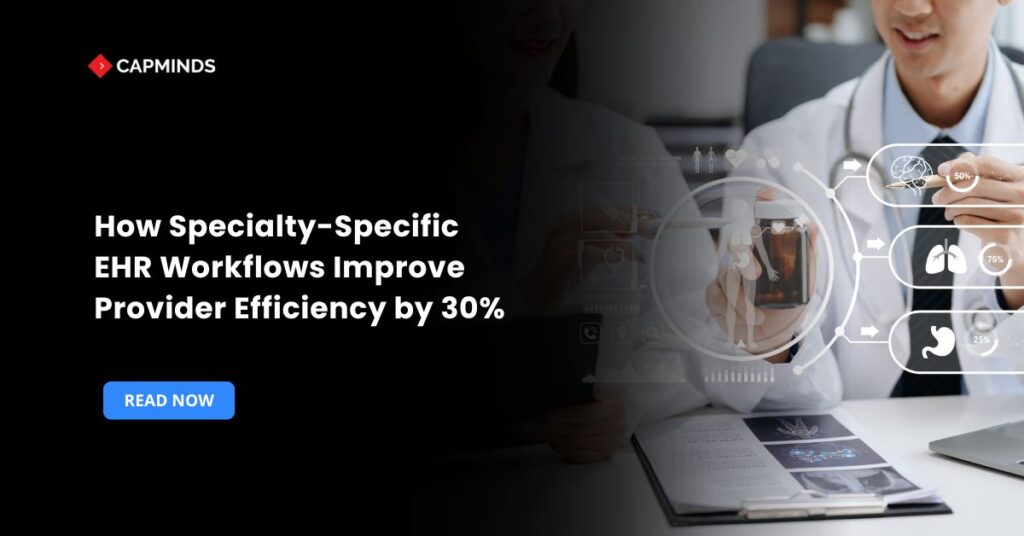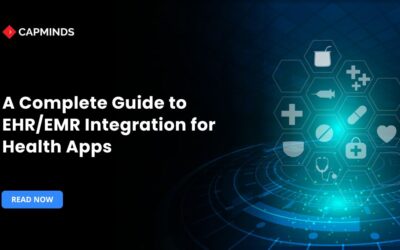How Specialty-Specific EHR Workflows Improve Provider Efficiency by 30%
Modern healthcare requires accuracy, quickness, and adaptability. Providers must balance patient expectations, regulatory compliance, and revenue management while aiming to provide quality care. Traditional EHR systems frequently slow down this process. Generic workflows, extra clicks, and unsuitable templates can annoy providers and lower productivity.
Specialty-specific EHR workflows help healthcare organizations to increase their productivity by up to 30% by adapting EHR systems to the particular needs of a specialty.
With focused templates, straightforward design, and specialty-driven features, physicians can spend more time with patients rather than documenting them. In this blog, you’ll know how customized specialty EHR improves providers’ workflow efficiency.
The Rising Demand for Specialty EHR
General-purpose EHRs were intended to fit everyone, but they don’t help every specialty. A cardiologist’s documentation requirements are substantially different from those of a dermatologist or a mental health physician. Using the same general technology encourages providers to follow tight procedures, which adds extra steps.
Specialty EHR solutions provide custom processes that match the clinical and administrative requirements of a specific department. From built-in specialist templates to role-based dashboards, these systems give exactly what providers require. This results in quicker documentation, fewer errors, and better patient outcomes.
Healthcare organizations understand that EHR customization is no longer an option, but a need. Custom EHR development allows providers to customize their systems to clinical operations, assuring productivity and compliance.
How EHR Workflows Affect Provider Productivity
EHR processes determine how well doctors navigate patient data, document interactions, and handle clinical activities. A poor process causes challenges, whereas a well-designed workflow increases speed, accuracy, and overall provider satisfaction.
Example:
A cardiology practice may require specialty-specific templates for ECG interpretation and chronic care management. If these templates are integrated into the workflow, documentation becomes smoother. Without customization, providers spend time searching for forms, inputting duplicate data, and manually updating reports.
Workflows can boost productivity in several ways:
- Reducing clicks and keystrokes by auto-filling data and offering quick-pick options.
- Improving accuracy with specialty-driven templates and validation criteria.
- Enhancing decision support through integrated alerts and evidence-based guidelines.
- Streamline billing using specialty-coded charge capture.
Why Specialty-Specific Templates are Important
Templates are the foundation of EHR workflows. A generic template may address a wide range of circumstances, but it lacks detail for specialized specialties.
For Example:
Oncologists require thorough chemotherapy procedures, whereas orthopedic practitioners require injury-specific data.
Specialty-specific templates allow providers to document faster because they only see fields relevant to their specialty. This saves time accessing irrelevant options, removes redundancy, and assures data accuracy. Templates also help clinical decision-making by incorporating specialist recommendations directly into the workflow.
Specialty templates increase billing accuracy. When documentation is consistent with specialist coding rules, claims are more likely to pass on the first try. This has a direct influence on income and minimizes denials, which is another factor that drives provider efficiency.
The Role of Custom EHR Development
No two practices are the same, even in a specialty. That is why medical specialty-specific EHR software is becoming popular. It allows providers to generate workflows, dashboards, and reports that mirror their actual processes.
Custom EHR development extends beyond simple templates. It could contain:
- Specialty dashboards provide quick access to frequent tasks.
- Integration with diagnostic instruments, such as ECG machines and imaging tools.
- Role-based workflows for physicians, nurses, and administrative staff.
- Automated checks for HIPAA and specialized regulations.
- Customized reporting for quality metrics and reimbursement programs.
Through the adoption of technology in clinical practice, providers can eliminate wasted labor and enhance efficiency. Personalization also enhances uptake; vendors will be more willing to work with an EHR that doesn’t seem to be imposed on them.
Specialty EHR – Increased Efficiency
Studies indicate that EHR workflows may improve physician efficiency by up to 30 percent in specialty-specific workflows. These advantages include the saving of time on documentation, lessening of errors, and enhancement of billing procedures.
Example: Consider Dermatology
A basic EHR may require several clicks to record a wound evaluation. Custom EMR software with dermatology templates that allows providers to capture details using a single form while automatically generating organized data and suggested codes.
Progress note templates, therapy session trackers, and outcome measures may be included in an EHR that is behavioral health-specific. These functions enhance the workflow, reduce paperwork, and enable the doctors to concentrate on the engagement with patients, instead of administrative tasks.
Custom EMR Software – Beyond Documentation
Efficiency is more than just documenting speed. Customized EMR creation improves interoperability, analytics, and patient engagement. With the correct design, providers may easily link with labs, imaging centers, and pharmacies. This avoids duplicate testing, eliminates fax-based operations, and enhances care coordination.
Specialty EHRs have an analytics dashboard that provides the provider with an opportunity to track performance indicators, including the success rates of treatments and patient waiting times. Providers with real-time insights are able to make faster decisions that are data-driven.
Patient engagement tools are another advantage. Specialty EHRs frequently include portals, telehealth tools, and specialty-specific automated reminders. These methods improve communication, reduce no-shows, and increase patient involvement in their care.
Key Advantages of Specialty-Specific EHR Workflows
- 30% improvement in provider efficiency by reducing documentation burdens
- Fewer errors and rework due to specialty-driven templates
- Faster reimbursements with accurate specialty coding
- Improved patient experience through streamlined communication
- Better provider satisfaction as workflows align with real-world practice
These findings explain why more healthcare firms are investing in custom EHR software rather than generic alternatives.
Custom EHR/EMR Services by CapMinds
At CapMinds, we understand that no two specialties are the same, and neither should their EHR workflows be. Our Custom EHR and EMR services are built to align with your clinical, administrative, and compliance needs, helping you achieve up to 30% higher provider efficiency.
By combining advanced technology with real-world healthcare expertise, we deliver solutions that reduce documentation burdens, improve billing accuracy, and enhance patient care.
Our services include:
- Custom EHR Development – Tailored dashboards, specialty-specific templates, and compliance-driven workflows.
- Custom EMR Software Solutions – Specialty-driven tools for documentation, reporting, and billing.
- EHR/EMR Workflow Optimization – Streamlined processes that save time and reduce errors.
- Integration & Interoperability Services – Connect labs, imaging centers, pharmacies, and external systems securely.
CapMinds is your partner in transforming generic systems into specialty-focused healthcare solutions that drive measurable results.
Ready to improve efficiency and provider satisfaction? Let’s build your custom solution today.




